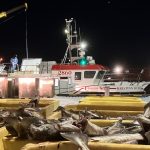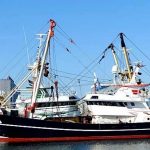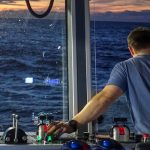A complete review of Western Australia’s valuable rock lobster fishery has resulted in independent and international endorsement of the State Government’s management of the resource.
Fisheries Minister Norman Moore today welcomed the Marine Stewardship Council’s (MSC) renewal of certification for WA’s rock lobster fishery following an expanded annual assessment of lobster stocks.
“The MSC renewal of certification is a vote of confidence in how the State is managing our most valuable fishery,” Mr Moore said.
“WA’s rock lobster fishery was the world’s first fishery to gain global MSC certification in March 2000.
“Following recent declines in puerulus (juvenile lobster) settlement and tough decisions by the State Government to cut fishing levels, the MSC insisted on an unprecedented complete rescoring of the way it applied certification.
“It is my understanding that the MSC was fully satisfied that the rock lobster fishery continues to meet its stringent standards of management and overall stock viability. This endorsement reflects the Government’s tough decisions to protect the long-term sustainability and economic viability of the fishery.”
The Minister said an example of the State Government’s unflinching leadership was the extension of recently announced closure periods.
“I supported the rock lobster industry advisory committee’s decision to extend the closure period and ensure the overall catch target was not reached before the lucrative Chinese New Year,” he said.
“It must be noted that the industry is also under pressure as a result of high exchange rates and reduced demand in international markets for their product, which has resulted in lower beach prices for fishermen.
“As a result of my decision to close the fishery over the Christmas period, the industry has seen the beach price rise from $22kg to $32kg – reflecting the Government’s efforts to smooth the catch over a longer period.”
Mr Moore said the decision to extend the closure was made as part of the adaptive management approach adopted by the State Government to ensure the overall catch remained around 5,500 tonnes (down from traditional averages of about 11,000 tonnes).
“The most immediate change will be closure of C zone, which includes the port of Jurien, the Perth coast and South-West waters to Cape Leeuwin,” he said.
“C zone will be closed to rock lobster fishing from January 18 until January 31, following the existing weekend closure.
“Fishing will resume in C zone on February 1 through until March 11, using the balance of the catch target for the full C zone season. There will be a further C zone closure from March 12 to April 11, with fishing resuming on April 12 if that target has not been exhausted. When C zone is open, fishing will be restricted to four days per week.”
The Minister said in B zone, which stretched from north of Jurien to North West Cape, the current closure was due to end on January 24, when additional management changes would apply.
“A zone commercial rock lobster fishers will fish in B zone from January 25 until the catch target for the first half of the season is exhausted,” he said.
“After that, A zone licensees will then cease fishing until the Abrolhos Islands (A zone) season opens on March 15.
“B zone commercial fishers will fish from January 25 until March 11. B Zone will then be closed from March 12 to April 11, with fishing allowed again from April 12.
“I will continue to consult with the industry to achieve the best possible outcome for the remainder of the season.”








